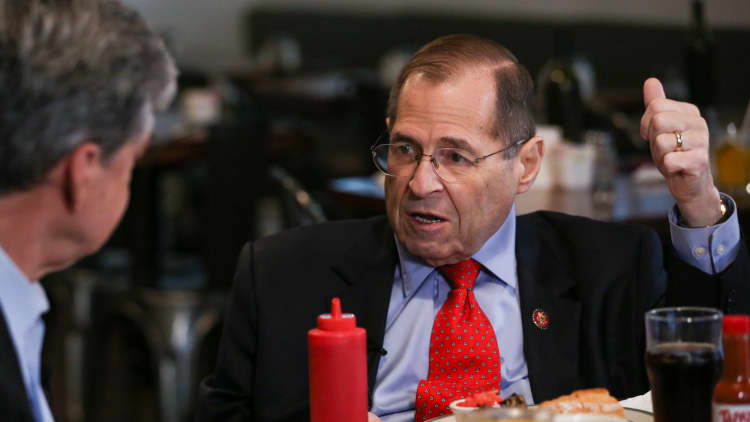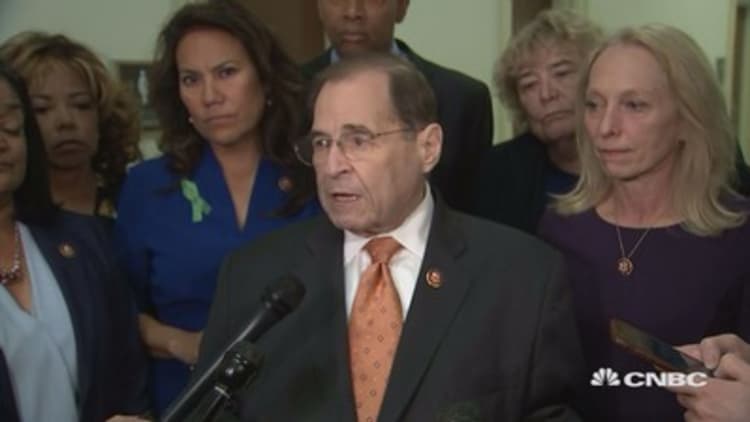
A federal judge ruled against President Donald Trump on Monday in a lawsuit to block a subpoena from House Democrats for information about his finances.
U.S. District Court Judge Amit Mehta strongly endorsed Congress' broad authority to investigate the president, striking a blow to arguments made by Trump's legal team.
Trump, speaking outside the White House shortly after the ruling came down, called the decision "crazy" and vowed to appeal it.
"As far as the financials are concerned," Trump said, "It's totally the wrong decision [by an] Obama-appointed judge."
Mehta wrote in a 41-page memorandum opinion that while "there are limits on Congress's investigative authority ... those limits do not substantially constrain Congress."
The House Oversight and Government Reform Committee subpoenaed accounting firm Mazars in April, requesting financial documents and related materials from Trump, his trust and a handful of his businesses. Trump's lawyers sued in Washington, D.C., federal court to block that subpoena, writing that Democrats had "declared all-out political war" against Trump.

While Trump's lawyers had argued that the committee's subpoena did not have a legitimate legislative purpose — and was therefore invalid — Mehta took a more liberal view.
"So long as Congress investigates on a subject matter on which 'legislation could be had,'" then Congress is acting within the bounds of the U.S. Constitution, the judge wrote. "President Trump cannot block the subpoena to Mazars."
The Democrat-led committee argued that the requested financial documents will help it strengthen ethics and disclosure laws and their penalties, as well as assisting in making sure that the president does not violate the emoluments clause of the Constitution.
"These are facially valid legislative purposes, and it is not for the court to question whether the Committee's actions are truly motivated by political considerations," Mehta wrote.
In a hearing in May, the president's lawyers argued that the Democrats' actions fell far afield of Congress' legitimate oversight functions as a legislative body. But Mehta questioned that argument, suggesting in the hearing that many historic congressional investigations — including the Watergate probe — might be considered invalid by the standard Trump's lawyers were asserting.
House Oversight Chairman Elijah Cummings, D-Md., praised the decision as a "resounding victory for the rule of law" in a statement Monday evening.
"The court recognized the basic, but crucial fact that Congress has authority to conduct investigations as part of our core function under the Constitution," Cummings said. "The court rejected President Trump's repeated claim that congressional investigations serve no 'legislative function' — a baseless argument made in response to multiple investigations by the House of Representatives."
Democrats in Congress have issued requests to Trump and dozens of other figures in his orbit for records on a variety of subjects, including the president's finances, his 2016 campaign and his inauguration committee. Some of their areas of inquiry also stem from the findings made public in special counsel Robert Mueller's report on Russian election meddling, possible obstruction of justice and possible conspiracy between the Trump campaign and the Kremlin.
Some of those requests have led to subpoenas — all of which Trump has vowed to fight.

Trump administration lawyers have defied other subpoenas from Democrats on the grounds that they, too, made demands outside of Congress' bounds. Treasury Secretary Steven Mnuchin on Friday refused to hand over six years of Trump's personal and business tax returns, arguing that a subpoena issued by the House Ways and Means Committee "lacks a legitimate legislative purpose."
The fight over the president's tax returns is likely headed to court.
Hours before Mehta's ruling was made available, press secretary Sarah Huckabee Sanders shared letters from Trump administration officials that showed Trump directing his former White House counsel, Don McGahn, not to comply with a subpoena to testify about special counsel Robert Mueller's Russia report.
That subpoena was issued by the House Judiciary Committee, which had voted in early May to hold Attorney General William Barr in contempt for refusing to comply with a subpoena to hand over the full, unredacted Mueller report and its underlying evidence.
The Mueller report did not find sufficient evidence to a show a conspiracy between the Trump campaign and the Kremlin, and Barr and former Deputy Attorney General Rod Rosenstein determined that the report did not show enough evidence to support an obstruction offense.



